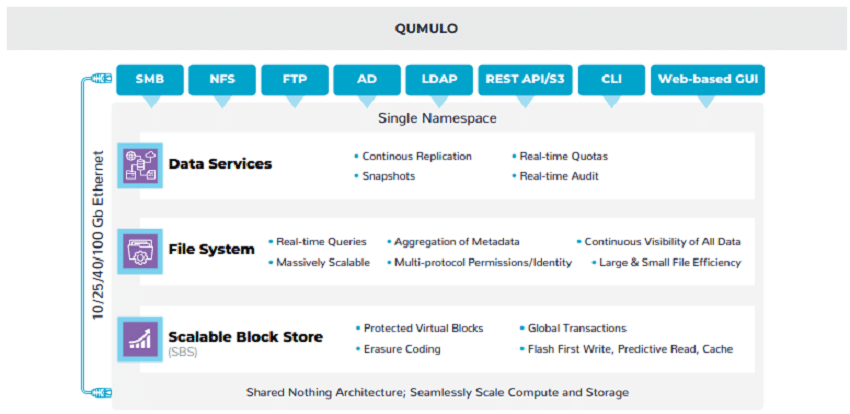Today, Qumulo released a new data encryption service they are calling Qumulo Secure. Qumulo also announced several other new services they expect to release before the end of the calendar year. Qumulo provides a distributed file system for network-attached storage (NAS) that offers customers tremendous flexibility in deployment. Earlier this year, we reviewed Qumulo’s software and interviewed Richard Kennedy, one of Qumulo’s Storage Architects and System Engineers.
Today, Qumulo released a new data encryption service they are calling Qumulo Secure. Qumulo also announced several other new services they expect to release before the end of the calendar year. Qumulo provides a distributed file system for network-attached storage (NAS) that offers customers tremendous flexibility in deployment. Earlier this year, we reviewed Qumulo’s software and interviewed Richard Kennedy, one of Qumulo’s Storage Architects and System Engineers.

The most important thing to know about Qumulo Secure is that it is baked into Qumulo’s standard software service, not sold separately. The new service adds AES 256-bit software encryption for at-rest data. Encryption at rest will be available by default on new clusters created with Qumulo Core 3.1.5 and above. Unfortunately, existing customers will have to build a new cluster to enable at-rest encryption. Since Qumulo already supports encrypting data in transit, Qumulo now provides a complete encryption service. Data is encrypted using AES 256-bit symmetric keys. The keys are also encrypted while at rest, and a master key is utilized and stored on every boot drive in the cluster in a file that only root can access for an extra layer of security. Encrypting the keys helps protect against potential threats like stolen disks or malicious actors in the supply chain obtaining decommissioned disks. Qumulo Secure also provides other security features, including role-based authentication (RBAC), audit, and encryption in-flight.
Qumulo Shift is also getting an upgrade today. The service is getting a new visual/graphical user interface to make it easier to relocate data. Qumulo Shift allows customers to move data in and out of their service or other cloud providers formats into an open format. We’ve previously covered the service, so that’s all I’ll say about it here, even though the service is one of my favorites because it so customer-friendly.
Qumulo also announced another new service that they are calling Qumulo Dynamic Scale today. The company is adding support to their existing software stack for adding new qualified platforms into existing environments with no need to manage different storage pools or perform a data migration. The new platforms are simply added to the existing environment. Data is then automatically redistributed by Qumulo software. The software also automatically manages exposing the increased performance and capacity made available to users and applications. Qumulo Dynamic Scale is currently targeting a release in the middle of next month. With a release date so near in the future, there’s little reason to expect any significant delays, so their planned date of December 15, 2020, is probably reliable.
That would be more than enough announcements for most companies, but Qumulo had three more announcements for us today. They’ve added support to make better use of NVMe as a cache to improve machine learning performance. The improved NVMe caching behavior is available today and included in software release 3.0.2. The company also announced two new qualified hardware options, the C-192T, and C-432T. The C-432T is actually due out tomorrow. The other qualified hardware option, the C-192T, can be ordered today but won’t enter general availability until the end of the month.
Availability
- Qumulo Secure – Immediately in software release 3.1.5
- Qumulo Shift GUI – Immediately in software release 3.3.0
- Software optimizations for NVMe as cache – Immediately in software release 3.0.2
- Qumulo Dynamic Scale – available December 15, 2020
- C-432T – November 10, 2020
- C-192T – November 25, 2020
Engage with StorageReview
Newsletter | YouTube | Podcast iTunes/Spotify | Instagram | Twitter | Facebook | RSS Feed
